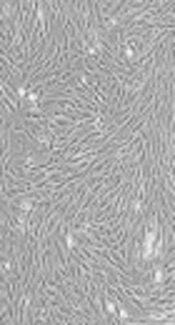Dear Editor,
Mesenchymal stem cells (MSCs) are an appealing candidate for tissue regeneration due to their ability to differentiate into many cell types (1). However, the use of stem cells has several problems such as complicated safety and quality management and high cost and difficult cell handling (2). On the other hand, MSCs secrete various trophic factors such as cytokines and growth factors that may regenerate damaged tissues (3). Due to limited survival and differentiation of transplanted MSCs, it is proposed that paracrine effect of MSC secretion is the principal mechanism for tissue regeneration (4).
Some studies investigated the effect of MSC conditioned medium (MSC-CM) on various diseases/conditions such as wound healing and cardiac and ischemic diseases (5). The therapeutic effects of MSC-CM are due to the panel of growth factors and cytokines presented in it. These factors inhibit apoptosis and improve cell proliferation (6). Also, MSC-CM stimulates mobilization and homing of endogenous stem cells into the local site of injury, without the necessity for cell transplantation (2).
Administration of MSC-CM improved bone healing in the rat model (7). It is shown that MSC-CM has a high potential for bone healing, mediated by cytokines such as TGF-β1, IGF-1, VEGF, and BMP-1. These factors regulate osteogenesis process, angiogenesis, cell migration, and osteoblast proliferation and differentiation (8).
Another application of MSC-CM is the neurological disorders. Some researchers reported that MSC-CM enhances motor activity after spinal cord injury. They concluded that MSC-CM reduced neuronal apoptosis and stimulated angiogenesis. These effects are attributed to some factors in MSC-CM such as NGF and BDNF (9).
Also, the therapeutic effect of MSC-CM was evaluated in the arthritis model. The obtained results showed that MSC-CM application decreased cartilage destruction and suppressed immune responses by creating a balance between pro- and anti-inflammatory cytokines (10). The application of MSC-CM has several advantages compared with the stem cells such as easily CM package and transportation (5).
In conclusion, the application of MSC-CM in regenerative medicine opened a new window to treat many clinical disorders. This procedure can establish a novel technique in tissue regeneration without the need for stem cells application.
